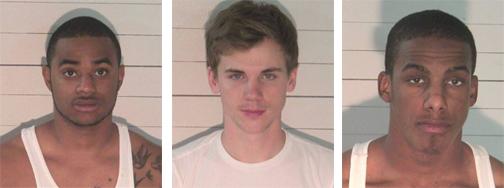STUDENTS CHARGED

Students have come forward with their stories following the Oct. 23 arrests in the Missouri Southern residence halls.
Broderick Hayes, freshman political science major, was arrested for possession of marijuana. He is currently fighting the charges.
“A lot of what I need to say to completely clear my name is still in litigation right now,” Hayes said. “A lot of it is still unfolding, but I can say that when this is all over and done with, my name will be cleared from the situation. My involvement in this situation should not have come to the extreme of me getting arrested. Just like anyone else, innocent until proven guilty. I just hope that my character, who the public thinks I am and who they already know me to be, will still stand as it was before this entire situation came about.”
Hayes was upset with last week’s story in The Chart due to a quote from Ken Kennedy, director of the Department of Public Safety.
“A truth from that is that I’m still on campus,” Hayes said. “They went into my dorm room, and I still live in my dorm room. Like the previous article said, those who were involved in the situation were removed; I’m not removed. As far as me being involved, we’ll know the gist of the situation. I’m an innocent person.”
Hayes said he allowed DPS to enter the room, not knowing any drugs were there.
“I didn’t expect to be arrested,” he said. “I was aware prior to my arrest that people were getting arrested. The way I felt about the situation when they came to my room was, ‘Oh. It’s the RD. Let her take care of business so I can go back to sleep.’ I never had a guilty conscience about the situation prior to the arrest. I wasn’t waiting for the sky to fall.”
Kennedy was not available for comment at press time. Other students have made claims that things were not dealt with in a procedural manner.
John Schwerdt, sophomore music performance major, returned home to see police and students being arrested about 1 a.m.
“I asked my roommate what was going on, and he just said that they had come and searched our room,” he said. “I said, ‘Why?’ and he said, ‘I don’t know.’ All I know is that they just searched everyone’s room with little to no reasoning. I don’t know why. They searched my room and didn’t find anything so it was just a waste of their time.”
He is unsure if his roommate gave permission, but Kennedy said everything was done according to procedure.
“Generally speaking, it was by consent,” Kennedy said. “It’s very common. In police jargon, it’s called a knock and talk. That’s what you call it when you have information of narcotics of some type or hallucinogenic or whatever are in a location and you knock on the door and ask for permission. Way more than 50 percent of the time you are given permission, whether it’s because if they don’t give permission it would just delay things; that there will be a search warrant obtained and generally the search would be done anyway. I know that they were looking to go into another room and didn’t. I know about the three, we had two in one, two in another and one in another.”
Schwerdt said a fire alarm set all this off.
“From what I understand somebody pulled the fire alarm and the campus security had to go over there to turn it off,” Schdwerdt said.
Kennedy said only three rooms were searched that night and that the fire alarm went off due to cleaner being sprayed.
“My officers let me know that we had credible information,” Kennedy said. “They asked if we wanted to call Joplin [Police Department]. I said, ‘No, we’re going to handle this one at a time and make sure we get everything processed and done before we move on to the next one,’ and we systematically moved from one room to the next through the night and were very successful in eradicating a lot of drugs from the campus that night.
“None of those situations actually resulted from the fire alarm. All those case numbers 170, 171, 472, those cases were intelligence initiated cases.”
Your donation will support the student journalists of Missouri Southern State University. Your contribution will allow us to purchase equipment and cover our annual website hosting costs.



























